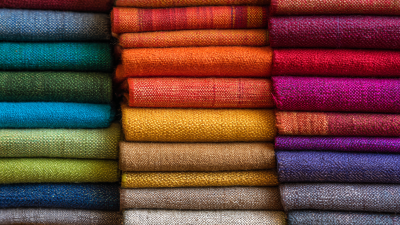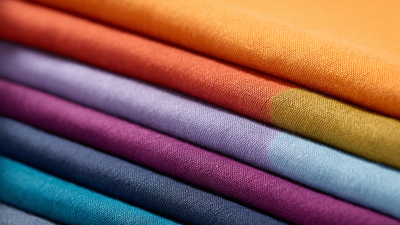- +86 13957580925
- 510515850@qq.com
- adela0928@163.com
In recent years, the fashion industry has begun to shift towards more sustainable practices, driven by growing consumer awareness and the urgent need to address environmental concerns. One notable innovation in this realm is Pp Polyester, a material that offers a myriad of benefits for eco-friendly textiles. According to a report by the Global Fashion Agenda, approximately 60% of all textiles produced in 2021 were made from synthetic fibers, with polyester accounting for about 52% of that figure. As the demand for sustainable alternatives increases, Pp Polyester emerges as a key player due to its recyclability and reduced environmental footprint.

Pp Polyester, derived from polypropylene, is not only lightweight and durable but also substantially less reliant on fossil fuels than traditional polyester. Studies indicate that using Pp Polyester in fashion can lead to reductions in greenhouse gas emissions of up to 30% compared to conventional synthetic fibers. Furthermore, as noted in the Ellen MacArthur Foundation’s latest report, the shift towards circular fashion can be significantly supported by the adoption of materials like Pp Polyester, which can be recycled multiple times without loss of quality. This positions Pp Polyester as not just a viable option but a transformative element in the pursuit of sustainable fashion, ultimately enabling brands to minimize waste and enhance their eco-conscious initiatives.
Polypropylene (PP) polyester is gaining traction as a sustainable alternative in the fashion industry, especially in the context of the environmental challenges posed by fast fashion. Defined as a thermoplastic polymer, PP polyester is recyclable and can significantly reduce reliance on virgin materials, which are notorious for their environmental detriments. The fast fashion industry, which produces a staggering amount of textiles that contribute to 10% of global CO2 emissions, highlights the urgent need for sustainable practices and materials. Reports indicate that this sector is also the second-biggest consumer of water, exacerbating issues of water scarcity.
Recent studies underscore the importance of sustainable practices, suggesting that textiles made from PP polyester can mitigate some of these ecological impacts. By utilizing recycled and bio-based fibers, brands can not only improve their carbon footprint but also promote a circular economy in fashion. The integration of life cycle assessments indicates that shifts towards eco-friendly materials like PP polyester, coupled with adherence to stringent environmental standards, can significantly lower the environmental costs associated with fabric production. As the fashion industry evolves, embracing such sustainable textiles is crucial for a greener and more responsible future.
Polypropylene (PP) polyester is gaining traction in the sustainable fashion industry, primarily due to its impressive eco-friendly properties. One of the key advantages of PP polyester is its recyclability; it can be recycled multiple times without losing quality, making it a more sustainable option compared to conventional polyester materials. According to a report from the Ellen MacArthur Foundation, transitioning to more recyclable materials can greatly reduce waste and pollution in the fashion industry, which is estimated to produce over 92 million tons of waste per year.
Moreover, PP polyester is lightweight and durable, which not only extends the lifespan of garments but also reduces the environmental impact associated with transportation. Research from the Textile World shows that lightweight materials can lead to significant reductions in carbon emissions during shipping. Additionally, this fabric is resistant to moisture and mildew, enhancing its functionality in various climate conditions, further promoting longevity and reducing the need for frequent replacements. As consumer preferences shift towards sustainable and ethical fashion, PP polyester stands out as a versatile and responsible choice for eco-conscious brands.
Polypropylene (PP) polyester has emerged as a sustainable alternative to traditional textiles, bringing a range of environmental benefits to the fashion industry. Unlike conventional materials such as cotton and polyester, which often require extensive water and chemical use, PP polyester is derived from recyclable resources and can be produced with a lower ecological footprint. The lightweight and durable nature of PP polyester also means that products made from this material often last longer, reducing the need for frequent replacements and thereby minimizing waste.
When comparing PP polyester to traditional textiles, it’s evident that the former offers superior sustainability. Traditional cotton farming consumes vast amounts of water and pesticides, contributing to soil degradation and water scarcity. In contrast, PP polyester can be produced from recycled plastic waste, transforming potential pollutants into valuable textiles. Additionally, unlike biodegradable materials that may decompose and release harmful substances, PP polyester remains stable, reducing the risk of environmental contamination. This shift towards using PP polyester reflects a broader trend in sustainable fashion, prioritizing eco-friendly practices while maintaining functionality and style.
Polypropylene (PP) polyester is emerging as a key player in the realm of sustainable fashion and eco-friendly textiles. Its lightweight, durable, and recyclable nature makes it an ideal material for modern fashion trends that prioritize environmental responsibility. According to a recent industry analysis, the plastic pallet market, which often employs PP, is projected to grow significantly, reflecting a broader trend towards sustainable materials in various applications. With its lower carbon footprint compared to other synthetic fibers, PP polyester supports the transition towards more eco-conscious practices in the textile industry.
Innovative applications of PP polyester are evident across several sectors, including the food and beverage industry, where sustainable packaging solutions are becoming crucial. Reports indicate that the demand for sustainable textiles will continue to rise, with projections showing a substantial increase in the use of PP and other environmentally friendly materials. This shift not only aligns with consumer preferences for greener products but also encourages brands to adopt responsible manufacturing processes. As more companies explore the potential of PP polyester, we can expect to see a significant impact on the fabric landscape, fostering a new era of fashion that values both style and sustainability.
The integration of PP (Polypropylene) polyester in sustainable fashion is becoming increasingly significant as consumers grow more eco-conscious. According to a report by the Ellen MacArthur Foundation, the fashion industry accounts for around 10% of global carbon emissions. This alarming figure highlights the urgent need for materials that reduce environmental impact. PP polyester stands out due to its lightweight, durability, and recyclability, presenting an eco-friendly alternative to traditional fabrics. As brands embrace this sustainable textile, consumer awareness becomes crucial.
Consumers can take proactive steps in supporting eco-conscious choices by considering products made of PP polyester. A recent survey by McKinsey & Company indicated that 66% of consumers are willing to pay more for sustainable brands. This trend illustrates the growing consumer demand for environmentally friendly options.
**Tips:** Look for labels that specify the use of recycled PP polyester to ensure that your purchases align with your sustainability values. Additionally, educate yourself about brands' sourcing practices; transparent companies often provide detailed information about their materials and environmental impact. Lastly, support local eco-friendly brands that prioritize sustainable practices in their production processes.
| Benefit | Description | Impact on Sustainability | Consumer Awareness Factor |
|---|---|---|---|
| Recyclability | PP polyester can be recycled multiple times, reducing waste. | Promotes circular economy and reduces landfill impact. | Higher awareness leads to increased recycling rates. |
| Durability | It is known for its strength and longevity when used in textiles. | Reduces frequency of replacements, lowering resource consumption. | Increased consumer preference for long-lasting products. |
| Water Resistance | PP polyester provides excellent water resistance. | Less water required in washing and maintenance. | Awareness of reduced maintenance needs encourages eco-friendly choices. |
| Lightweight | Lightweight fabric helps in reducing transportation carbon footprint. | Lower emissions during shipping processes. | Consumers favor products that are efficient in shipping weight. |
| Affordability | More cost-effective compared to other sustainable materials. | Increased accessibility to eco-friendly fashion. | Consumer education on balancing cost and sustainability. |






